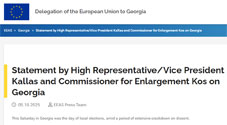
EU Officials Express Concern Over Georgia's Local Elections, Urge Calm and Dialogue
By Liza Mchedlidze
Monday, October 6, 2025
The European Union's High Representative and Vice-President of the European Commission, Kaja Kallas, and the EU Commissioner for Enlargement, Marta Kos, have issued a joint statement expressing concern over the conduct of Georgia's recent local self-governance elections.
According to the statement, the elections, held on Saturday, took place "in an environment of large-scale suppression of differing opinions." The EU officials highlighted what they described as growing challenges to democratic standards in the country and urged political actors to engage in "constructive and inclusive dialogue" that involves all parties and representatives of civil society.
Kallas and Kos also called on all sides to avoid violence in the post-election period. "We call for calm and restraint and urge the government to protect the freedom of assembly and expression of citizens," the statement said.
The EU officials criticized what they described as "months-long attacks on independent media, the adoption of laws targeting civil society, the imprisonment of opponents and activists, and changes to the electoral code favoring the ruling party," saying these developments had "sharply reduced the possibility of holding competitive elections."
They noted that a large portion of the opposition had boycotted the vote and that voter turnout was relatively low. The statement also expressed regret over the Georgian government's "refusal to timely invite international observers, specifically OSCE/ODIHR," which, they said, harmed the transparency of the electoral process. Local monitoring groups also reportedly refrained from observation due to what the statement described as a repressive environment.
"A large number of people have been continuously protesting the repressive policy of the ruling party, Georgian Dream. We call for the release of all those who were unjustly detained," Kallas and Kos said.
The statement further condemned what it called "disinformation regarding the EU's role in Georgia" and "personal attacks against the EU Ambassador," stressing that the European Union "firmly rejects and condemns" such actions.

